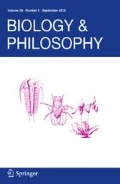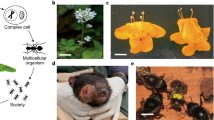Abstract
Many researchers have assumed that punishment evolved as a behavior-modification strategy, i.e. that it evolved because of the benefits resulting from the punishees modifying their behavior. In this article, however, we describe two alternative mechanisms for the evolution of punishment: punishment as a loss-cutting strategy (punishers avoid further exploitation by punishees) and punishment as a cost-imposing strategy (punishers impair the violator’s capacity to harm the punisher or its genetic relatives). Through reviewing many examples of punishment in a wide range of taxa, we show that punishment is common among plant and animal species and that the two mechanisms we describe have often been important for the evolution of punishment.
Similar content being viewed by others
Notes
We do not claim that the evolution of punishment was never influenced by the benefits resulting from the punishee modifying its behavior. Rather, looking at many diverse taxa, we argue that this was often not the case.
In this article, the concept of action should be understood very broadly so as to apply to plants, bacteria, etc.
Our reviewers objected that the notion of short-term fitness made no sense. However, first, whether or not this notion makes sense depends on how fitness is conceptualized. In particular, this notion makes perfect sense if fitness is conceptualized as a propensity (roughly, a probabilistic disposition to survive and reproduce), as many philosophers of biology have proposed (e.g., Beatty and Mills 1979) since the strength of this disposition can vary across time. Second, in using this notion we are simply following some evolutionary biologists’ discussion of punishment and cooperation (e.g., Bergmüller et al. 2007, 64; West et al. 2007a, R666; West et al. 2011, 235). Third, if the reader’s views about fitness are incompatible with the notion of short-term fitness, the notion of a decrease in short-term fitness may be replaced with the notion of immediate payoff loss. .
Harassment (e.g., Gilby 2006 for harassment in chimpanzees) is thus not a form of punishment since the harassed individual (e.g., those chimpanzees that possess some food) did not cause any harm.
This definition has the disadvantage to apply to some forms of conditional harming that do not count as punishment, such as defense against predators. We note that it is difficult to define punishment so as to include all actions that intuitive count as punishment and to exclude traits such as defense against predators.
West et al. (2007b, 422) write that “[p]unishment can be selfish or altruistic (like cooperation) or even spiteful, and so without detailed analysis of particular situations, the word ‘punishment’ should not be given a prefix such as ‘altruistic’.” Punishment is altruistic when it reduces the long-term fitness of the actor, but increases the long-term fitness of other organisms, e.g., apparented organisms.
Data from the Bureau of Justice Statistics (BJS) obtained in December 2011 (http://bjs.ojp.usdoj.gov).
Gardner and West (2004b, 754) are explicit that humans provide the prototype for this approach: “We discuss our model in terms of humans because this is where much of the recent theoretical literature has been focused. However, the implications are general and could be applied to a variety of organisms.”
This very simple idea also can be extended to interactions in a larger group. See Hirshleifer and Rasmusen (1989) for a formal treatment.
See West et al. (2007b) for a useful clarification of the distinction between direct and indirect benefits.
Our reviewers noted that we did not discuss the possibility that the function of punishment is deterrence. The reason is that, for most of the cases considered in this article, deterrence is more likely to be a by-product of the evolution of punishment than its evolutionary function. That is, in these cases, after punishment evolved for a reason other than deterrence, punishees then evolved to modulate their behavior as a function of the capacity and likelihood of the victim of a violation to punish (Cant and Johnstone 2006). This scenario is likely because, for deterrence to be the function of punishment, the punishee would have had to be sufficiently behaviorally flexible to modulate their behavior in response to punishment. This is unlikely to be the case for most of the cases we consider in this article. (Recall that we do not discuss punishment among human beings).
Soybeans do not always recognize the lineages of cheating rhibozia (Kiers et al. 2003, 79).
The same is true of the cooperation between male and female cleaners that work in pairs.
References
Beatty J, Mills S (1979) The propensity interpretation of fitness. Philos Sci 46:263–288
Bergmüller R, Johnstone RA, Russell AF, Bshary R (2007) Integrating cooperative breeding into theoretical concepts of cooperation. Behav Process 76:61–72
Boyd R, Richerson P (1992) Punishment allows the evolution of cooperation (or anything else) in sizable groups. Ethol Sociobiol 13:171–195
Boyd R, Gintis H, Bowles S, Richerson P (2003) The evolution of altruistic punishment. Proc Natl Acad Sci 100(6):3531–3535
Boyd R, Gintis H, Bowles S (2010) Coordinated punishment of defectors sustains cooperation and can proliferate when rare. Science 328:617–620
Bshary R, Grutter AS (2005) Punishment and partner switching cause cooperative behaviour in a cleaning mutualism. Biol Lett 1:396–399
Cant MA, Johnstone RA (2006) Self-serving punishment and the evolution of cooperation. J Evol Biol 19(5):1383–1385
Caro TM, Hauser MD (1992) Is there teaching in nonhuman animals? Q Rev Biol 67(2):151–174
Clutton-Brock TH, Parker GA (1995) Punishment in animal societies. Nature 373:209–216
Edwards DP, Hassall M, Sutherland WJ, Yu DW (2006) Selection for protection in an ant-plant mutualism: host sanctions, host modularity, and the principal-agent game. Proc R Soc B 273:595–602
Foster KR, Wenseleers T, Ratnieks FLW (2001) Spite: hamilton’s unproven theory. Ann Zool Fennici 38:229–238
Gardner A, West SA (2004a) Spite and the scale of competition. J Evol Biol 17:1195–1203
Gardner A, West SA (2004b) Cooperation and punishment, especially in humans. Am Nat 164:753–764
Gardner A, West SA (2006) Spite. Curr Biol 16:R662–R664
Gardner A, Hardy ICW, Taylor PD, West SA (2007) Spiteful soldiers and sex ratio conflict in polyembryonic parasitoid wasps. Am Nat 169:519–533
Gilby I (2006) Meat sharing among the Gombe chimpanzees: harassment and reciprocal exchange. Anim Behav 71:953–963
Grafen A (1990) Biological signals as handicaps. J Theor Biol 144(4):517–546
Hamilton WD (1970) Selfish and spiteful behaviour in an evolutionary model. Nature 228:1218–1220
Hauser M (1992) Costs of deception: cheaters are punished in rhesus monkeys (Macaca mulatta). Proc Natl Acad Sci 89:12137–12139
Henrich J, Boyd R (2001) Why people punish defectors: conformist transmission stabilizes costly enforcement of norms in cooperative dilemmas. J Theor Biol 208:79–89
Henrich J, McElreath R, Barr A, Ensimger J, Barrett C, Bolyanatz A, Cardenas JC, Gurven M, Gwako E, Henrich N, Lesorogol C, Marlowe F, Tracer D, Ziker J (2006) Costly punishment across human societies. Science 312:1767–1770
Hirshleifer D, Rasmusen E (1989) Cooperation in a repeated prisoners’ dilemma with ostracism. J Econ Behav Organ 12:87–106
Jandér KC, Herre EA (2010) Host sanctions and pollinator cheating in the fig tree-fig wasp mutualism. Proc R Soc B 277:1481–1488
Jensen K (2010) Punishment and spite, the dark side of cooperation. Philos Trans R Soc B 365:2635–2650
Jensen K, Call J, Tomasello M (2007a) Chimpanzees are rational maximizers in an ultimatum game. Science 318:107–109
Jensen K, Call J, Tomasello M (2007b) Chimpanzees are vengeful but not spiteful. Proc Natl Acad Sci 104(32):13046–13050
Kiers ET, Rousseau RA, West SA, Denison RF (2003) Host sanctions and the legume-rhizobium mutualism. Nature 425:78–81
Lehmann L, Bargum K, Reuter M (2006) An evolutionary analysis of the relationship between spite and altruism. J Evol Biol 19:1507–1516
Mathew S, Boyd R (2011) Punishment sustains large-scale cooperation in prestate warfare. Proc Natl Acad Sci 108:11375–11380
Mills SC, Cóte IM (2010) Crime and punishment in a roaming cleanerfish. Proc R Soc B 277:3617–3622
Mitchell S (2003) Biological complexity and integrative pluralism. Cambridge University Press, New York
Monnin T, Ratnieks FLW (2001) Policing in queenless ponerine ants. Behav Ecol Sociobiol 50:97–108
Nowak M, Highfield R (2010) SuperCooperators: Altruism, evolution, and why we need each other to succeed. Free Press, New York
Oliver P (1980) Rewards and punishments as selective incentives for collective action: theoretical investigations. Am J Sociol 85:1356–1375
Pellmyr O, Huth CJ (1994) Evolutionary stability of mutualism between yuccas and yucca moths. Nature 372:257–260
Raihani NJ, Thornton A, Bshary R (2012) Punishment and cooperation in nature. Trends Ecol Evol 27:288–295
Ratnieks FLW, Wenseleers T (2008) Altruism in insect societies and beyond: voluntary or enforced? Trends Ecol Evol 23:45–52
Rohwer Y (2006) Hierarchy maintenance, coalition formation, and the origins of altruistic punishment. Philos Sci 74(5):802–812
Skinner BF (1953) Science and human behavior. Macmillan, New York
Sripada CS (2005) Punishment and the strategic structure of moral systems. Biol Philos 20:767–789
Stevens JR, Hauser MD (2004) Why be nice? Psychological constraints on the evolution of cooperation. Trends Cogn Sci 8(2):60–65
Stevens JR, Cushman FA, Hauser MD (2005) Evolving the psychological mechanisms for cooperation. Ann Rev Ecol Evol Syst 36:499–518
Strassmann JE (2004) Rank crime and punishment. Nature 432:160–162
Thorndike EL (1901) Animal intelligence: an experimental study of the associative processes in animals. Psychol Rev Monogr Suppl 2:1–109
Thornhill R, Thornhill N (1989) An evolutionary analysis of psychological pain following rape: I. The effects of victim’s age and marital status. In: Betzig L (ed) Human nature: a critical reader. Oxford University Press, New York, pp 225–238
Tibbetts EA, Dale J (2004) A socially enforced signal of quality in a paper wasp. Nature 432:218–222
Trivers R (1985) Social evolution. Benjamin-Cummings, New York
West SA, Gardner A (2010) Altruism, spite and greenbeards. Science 327:1341–1344
West SA, Griffin AS, Gardner A (2007a) Evolutionary explanations of cooperation. Curr Biol 17:R661–R672
West SA, Griffin AS, Gardner A (2007b) Social semantics: altruism, cooperation, mutualism, strong reciprocity and group selection. J Evol Biol 20:415–432
West SA, El Mouden C, Gardner A (2011) 16 common misconceptions about the evolution of cooperation in humans. Evol Hum Behav 32:231–262
West-Eberhard MJ (1986) Dominance relations in Polistes Canadensis (L.), a tropical social wasp. Monitore Zool Italiano (Nuova Serie) 20:263–281
Wong MYL, Buston PM, Munday PL, Jones GP (2007) The threat of punishment enforces peaceful cooperation and stabilizes queues in a coral-reef fish. Proc R Soc B 274:1093–1099
Wrangham RW, Peterson D (1996) Demonic males: Apes and the origins of human violence. Houghton Mifflin, Boston
Young AJ, Carlson AA, Monfort SL, Russell AF, Bennett NC, Clutton-Brock T (2006) Stress and the suppression of subordinate reproduction in cooperatively breeding meerkats. Proc Natl Acad Sci 103(32):12005–12010
Zahavi A (1975) Mate selection: a selection for a handicap. J Theor Biol 53(1):205–214
Author information
Authors and Affiliations
Corresponding author
Rights and permissions
About this article
Cite this article
Nakao, H., Machery, E. The evolution of punishment. Biol Philos 27, 833–850 (2012). https://doi.org/10.1007/s10539-012-9341-3
Received:
Accepted:
Published:
Issue Date:
DOI: https://doi.org/10.1007/s10539-012-9341-3




